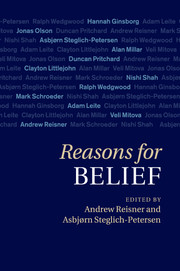Book contents
- Frontmatter
- Contents
- Contributors
- Preface
- Introduction
- PART I NORMATIVE REASONS FOR BELIEF
- 1 How to be a teleologist about epistemic reasons
- 2 Is there reason to be theoretically rational?
- 3 Epistemic motivation
- 4 Error theory and reasons for belief
- 5 Can reasons for belief be debunked?
- PART II REASONS AND EPISTEMIC JUSTIFICATION
- References
- Index
4 - Error theory and reasons for belief
Published online by Cambridge University Press: 05 July 2011
- Frontmatter
- Contents
- Contributors
- Preface
- Introduction
- PART I NORMATIVE REASONS FOR BELIEF
- 1 How to be a teleologist about epistemic reasons
- 2 Is there reason to be theoretically rational?
- 3 Epistemic motivation
- 4 Error theory and reasons for belief
- 5 Can reasons for belief be debunked?
- PART II REASONS AND EPISTEMIC JUSTIFICATION
- References
- Index
Summary
INTRODUCTION
According to moral error theory there are no moral reasons. Moral reasons would be metaphysically queer entities not recognizable from the perspective of philosophical naturalism. Consequently, claims about what there is moral reason to do are never true. Recently several philosophers have highlighted the structural similarities between moral reasons and epistemic reasons, or reasons for belief. This raises the question whether, from the error theorist's naturalistic perspective, epistemic reasons should be deemed equally queer as moral reasons. Should the moral error theorist also accept an error theory about epistemic reasons? But isn't error theory about reasons for belief obviously unappealing? These are questions I intend to pursue in this essay.
Some philosophers have argued that epistemic reasons are an embarrassment for moral error theorists. Using a ‘companions in guilt’ strategy, some of these philosophers have argued that error theory about epistemic reasons is implausible and that therefore error theory about moral reasons should be deemed equally implausible. Some have gone as far as to claim that error theory about epistemic reasons is self-defeating. Terence Cuneo, who has offered the most elaborate and thorough examination of the parallelisms between moral and epistemic reasons, maintains that epistemic error theory implies at least three ‘undesirable results’ that should prompt us to reject the theory, and with it moral error theory. I shall investigate how undesirable these results really are.
Keywords
- Type
- Chapter
- Information
- Reasons for Belief , pp. 75 - 93Publisher: Cambridge University PressPrint publication year: 2011
- 35
- Cited by

